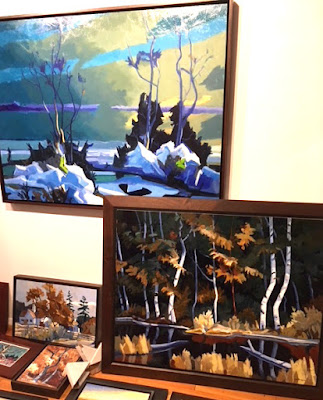My "Time Travel " with Charles Burchfield
Philip Koch working in his Baltimore studio on his painting
Evergreen, 40 x 60 inches, that will be included in Burchfield
Penney Art Center's exhibition of his work April 13 - July 29, 2018
I wrote the following about the remarkable experience I had in the two years I served as the Artist in Residence at the Burchfield Penney Art Center in 2015-17. Right now I am bus preparing for that museum's exhibition of my paintings and drawings from the Residency- it's set to open April 13 and run through July 29, 2018.
Time Travel in the Burchfield Archives
We all think we know who we are.
Sometimes an unexpected event shows us how wide of the mark our thinking has
been. So it was with my experience the last two years being the Artist in
Residence at the Burchfield Penney Art Center. It provided a close encounter
with the work of another painter, Charles Burchfield. Burchfield, a fellow
landscape painter, was an artist with a powerful imagination that had taken him
into a distinctively personal style.
My first though when the Center
invited me to serve as an Artist in Residence was pretty modest. It would be a
chance to do a lot of painting near where I’d grown up in Rochester, something
I’d always wanted to do. And I figured I’d pick up a few new ideas about color
from looking at his paintings. That was pretty much it.
Burchfield’s style of painting was
sufficiently different from than mine that I wasn’t worried that I’d be seduced
into just working in his footsteps. I was right about that. What I didn’t
anticipate were more indirect influences. How looking at his working methods
and arc of his career would send me back in time to reorient how I see myself
as an artist.
Let me explain.
In addition to having the largest
collection of Charles Burchfield's paintings, the Burchfield Penney has the
Burchfield Archives, an exhaustive collection of the artist's writings,
notes, serious drawings, quick sketches, doodles and memorabilia. When I first
began vising BPAC as the Artist in Residence I was invited to come to the
Archives and study some drawings Burchfield produced. I had no idea what I
would find there. More than for most artists, making drawings has always been a
central part of my own painting. I was amazed to discover just how pivotal a
role drawing played in Burchfield’s creativity. The Archives contained an
overwhelming number - over 20,000 drawings alone.
Living, having emotions and being
able to respond to the world around us are remarkable, and all too temporary,
things. We would be fools not to open our eyes and drink in the look and feel
of being alive on this planet. Going through Burchfield’s drawings one begins
to realize that Burchfield had a deep and profound sense of this.
There’s an almost astonishing level
of wonder and celebration found in the archival boxes containing his drawings-
sometimes he would make the most elegantly detailed studies of the twists and
turns of an individual leaf. Some were so delicately detailed that I thought
they could have been drawn by Leonardo DaVinci. Other times he would be
searching for the best way to convey a new idea and churned out drawing after
drawing trying out subtle changes in his composition. The level of energy on
display revealed a no-holds-barred, passion for his subjects. I couldn’t help
but leave these visits to the Archives inspired.
The other surprise was how
seriously Burchfield took his efforts. He seemed to save everything. They had
been lovingly cared for in a far more organized way than I’d ever considered
for my own artwork.
I resolved to start my own
long-delayed project to catalogue my own work, scanning a huge pile of old 35mm
slides of my earlier paintings and recording information about them.
Undertaking my new archiving project forced me to go back through hundreds of
images of paintings and drawings I had done three and even four decades before.
While I hadn’t totally forgotten any of these earlier works I had unconsciously
edged them to a far back burner on my mental stove.
Early in my career I primarily
worked outdoors painting with oil paint. But in the last 15 years I’d largely
abandoned that in favor of painting in my studio from black and white drawings.
When I first came to Buffalo for my Residency I was convinced this was to be my
studio method permanently.
Yet starting my new archiving
project I was surprised how much I enjoyed looking at my early work that I done
directly outdoors. They were far more exciting than I had remembered them. This
set me to thinking.
I knew Burchfield himself had
undergone major shifts in his paintings. His early years in Ohio saw vividly
colored and slightly fantastical imagery. Moving to Buffalo his paintings
became more somber and straightforward. Yet later in his life he made a serious
re-evaluation, dipping his brush again into the deeper well of his highly
charged imagination. The brighter colors and bold fantasy returned. Burchfield
seemed to have reached back in time and recaptured much of the mystery and
magic of his early paintings.
It struck me that if Burchfield in
full maturity could re-evaluate his methods and make serious changes, so could
I. Maybe I could do some travel back in time too.
My experience in the Burchfield
Archives was like a fresh gust of wind filling my sails, encouraging me and
challenging me to change my own course. I’m now working outdoors in oils again.
The fields I am finding there, having lain fallow for years, seem newly refreshed
and fertile.
Philip Koch, January, 2018



